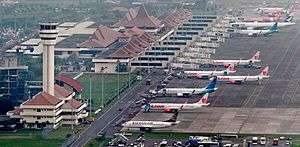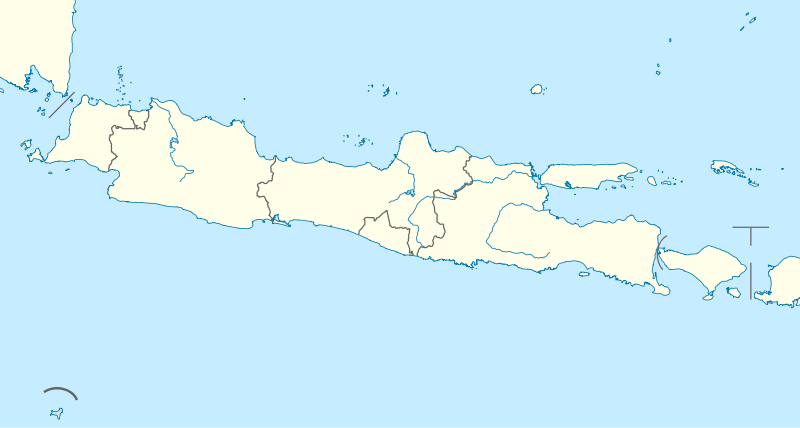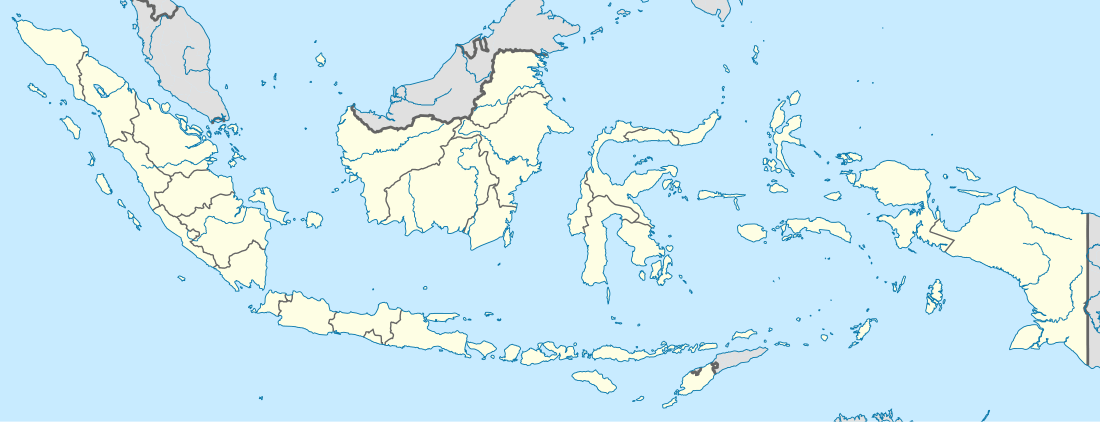Juanda International Airport
| Juanda International Airport Bandar Udara Internasional Juanda | |||||||||||
|---|---|---|---|---|---|---|---|---|---|---|---|
|
| |||||||||||
 | |||||||||||
|
IATA: SUB – ICAO: WARR – WMO: 96935 | |||||||||||
| Summary | |||||||||||
| Airport type | Public / Military | ||||||||||
| Owner | Government of Indonesia | ||||||||||
| Operator | PT Angkasa Pura I | ||||||||||
| Serves | Gerbangkertosusila | ||||||||||
| Location | Sedati, Sidoarjo Regency, East Java, Indonesia | ||||||||||
| Opened |
| ||||||||||
| Hub for | |||||||||||
| Time zone | WIB (UTC+07:00) | ||||||||||
| Elevation AMSL | 9 ft / 3 m | ||||||||||
| Coordinates | 07°22′47″S 112°47′13″E / 7.37972°S 112.78694°ECoordinates: 07°22′47″S 112°47′13″E / 7.37972°S 112.78694°E | ||||||||||
| Website | juanda-airport.com | ||||||||||
| Map | |||||||||||
 SUB  SUB Location within Java Island, Indonesia | |||||||||||
| Runways | |||||||||||
| |||||||||||
| Statistics (2015) | |||||||||||
| |||||||||||
Juanda International Airport (JIA) (Indonesian: Bandar Udara Internasional Juanda) (IATA: SUB, ICAO: WARR), is an international airport located in Sedati, Sidoarjo and one of the major airports of Indonesia. This airport is located approximately 12 kilometers (8 miles) from Surabaya and serves the Gerbangkertosusila, greater metropolitan area of Surabaya. Juanda International Airport is operated by PT Angkasa Pura I. The airport takes its name after Djuanda Kartawidjaja, the last Prime Minister of Indonesia who had suggested development of this airport. Juanda International Airport is one of the busiest airport in Indonesia based on the aircraft movements and passenger movements. In 2010, the airport handled 11 million passengers, although the capacity was 6 million passengers and the Air Traffic Controller radar system is only able to track 21 aircraft per hour, but at peak hour should handled 40 to 45 aircraft landing and taking off.[1] In 2013, the airport serves about 400 aircraft per day.[2]
Currently, Juanda International Airport is the hub of Citilink, Garuda Indonesia, Indonesia AirAsia, Lion Air, and Sriwijaya Air along with Soekarno–Hatta International Airport. Juanda International Airport will become one of the main airports in Indonesia for ASEAN Open skies.[3]
In 2014, Juanda International Airport becomes the world's 10th best in Airport Service Quality by Airport Council International among 79 airports with passengers capacity between 5-15 million a year.[4] And in Q1 2015 this airport increased becomes the world's 7th Airport by ACI.[5]
History
Opened in 1964 as a naval air base of Indonesia. It replaces the previous airport in Morokrembangan, near Tanjung Perak harbor. It was originally used as home base for Indonesian Navy's fleet of Ilyushin Il-28 and Fairey Gannet. In its development it was also used for civil aviation. And PT Angkasa Pura I handled the management and operation since January 1985. On December 24, 1990 Juanda Airport was gained international airport status after the opening of the international terminal. Previously, since December 1987, the airport has served flights to Singapore, Hong Kong, Taipei and Manila.[6]
Airport development
A new three-story terminal building was opened on November 10, 2006. The building has a capacity of eight million passengers per year and features a 51,500-square-metre (554,000 sq ft) domestic passenger terminal, a 20,200-square-metre (217,000 sq ft) international terminal and 11 airbridges. There is a single runway of 3,000 by 55 metres (9,843 ft × 180 ft), separate 5,300-square-metre (57,000 sq ft) administration building, including a 15-story control tower, and a two-storey cargo building with domestic and international cargo sections, capable of handling 120,000 tonnes (120,000 long tons; 130,000 short tons) of cargo a year. The terminal used a mix of high hat roofs from Rumah adat Sumba as well as Java-Malay architecture themes.
The new apron with an area of 148,000 square metres (1,590,000 sq ft) can handle 18 aircraft simultaneously, including two wide body, 11 medium and five small aircraft. There are two 3,000-by-30-metre (9,843 ft × 98 ft) parallel taxiways, including five exit taxiways (30 m wide) and four connecting taxiways (also 30 m).
The old terminal building has been demolished and became the new Terminal 2, which opened on February 14, 2014. The architecture of T2 is modern with curved features when compared to Terminal 1.
On February 25, 2015, Indonesia President Joko Widodo agreed to develop Juanda Airport City which consists such as additional two runways becomes triple runways. Integrated connection between Gubeng railway station with the airport uses elevated railway. The projects will be built soon with coordination of central government, provincial government and city government, including the funding and predicted will be finished in 2019 due to overcapacity of 17.2 million passengers in 2014, while the current capacity is only for 12.5 million passengers.[7][8]
As of January 6, 2016, building of the two runways and Terminal 3 is on Detail Engineering Design (DED) and Land Relinquishment. Based on East Java Website, construction will start in the beginning of 2017. Terminal 3 will be predicted to handle 62.5 million passengers per year, with the overload Terminal 1 and 2 it would capable of handling 75 million passengers per year. The runways will be around 3850 meters long and 60% of it will be over the sea. If construction began with no delay it is predicted to open in 2019.
Statistics
The following are statistics for the airport from 1999 to 2013. In addition to this, it is noted that, in 2006, the domestic sector between Surabaya and Jakarta is the fourth-busiest air route in Asia with over 750 weekly flights.
| Year | Total passengers | Cargo (tons) | Aircraft movements |
|---|---|---|---|
| 1999 | 2,137,353 | 40,549 | 52,284 |
| 2000 | 2,712,074 | 31,185 | 54,154 |
| 2001 | 3,301,435 | 37,767 | 62,141 |
| 2002 | 4,746,113 | 43,089 | 75,921 |
| 2003 | 6,584,711 | 42,910 | 82,779 |
| 2004 | 8,562,747 | 63,950 | 97,421 |
| 2005 | 8,217,415 | 66,647 | 99,485 |
| 2006 | 8,986,650 | 71,574 | 91.209 |
| 2007 | 8,823,228 | 58,815 | 87,687 |
| 2008 | 9,122,196 | 62,289 | 69,726 |
| 2009 | 10,562,906 | 62,357 | 76,754 |
| 2010 | 12,072,059 | 76,774 | 84,958 |
| 2011 | 13,778,287 | 95,146 | 103,846 |
| 2012 | 16,447,912 | 102,133 | 141,365 |
| 2013 | 17,683,955 | 121,935 | 155,421 |
| 2014 | 18,071,633 | 92,439 | 117,825 |
| 2015 (estimated) | 18,911,256 | 130,398 | 166,208 |
Source : PT (persero) ANGKASA PURA 1 (Indonesian)
Passenger terminals
Juanda International Airport has 2 terminals: Terminal 1 for all domestic flights, except Garuda Indonesia and Indonesia AirAsia flights, and Terminal 2 for all international flights, Garuda Indonesia and Indonesia AirAsia domestic and international flights.
Airlines and destinations
Passenger
Cargo
| Airlines | Destinations |
|---|---|
| My Indo Airlines | Singapore |
| Garuda Indonesia Cargo | Singapore |
| Republic Express Airlines | Jakarta-Soekarno-Hatta |
Accidents and incidents
- On March 4, 2006, Lion Air Flight 8987, a McDonnell Douglas MD-82 from Ngurah Rai International Airport of Denpasar, crashed after landing at Juanda International Airport. Reverse thrust was used during landing, although the left thrust reverse was stated to be out of service. This caused the aircraft to veer to the right and skid off the runway, coming to rest about 7,000 feet (2,100 m) from the approach end of the runway. There were no fatalities, but the aircraft was badly damaged.
- On February 21, 2007 Flight 172, an Adam Air Boeing 737-300 aircraft flying from Jakarta to Surabaya with registration PK-KKV (c/n 27284), had a hard landing at Juanda International Airport, resulting in structural failure of the aircraft.[14]
- On April 13, 2010, Cathay Pacific Flight 780, an Airbus A330-342 from Juanda International Airport to Hong Kong landed safely after both engines failed due to contaminated fuel, which was uploaded at Surabaya.[15]
- On February 1, 2014, Lion Air Flight 361, a Boeing 737-900ER (registration PK-LFH), from Balikpapan Sultan Aji Muhammad Sulaiman Airport to Juanda International Airport in Surabaya, with 222 passengers and crew on board, landed hard and bounced four times on the runway, causing a tail strike and substantial damage to the plane. There were no fatalities, but two passengers were seriously injured and three others had minor injuries.[16]
Gallery
 Terminal 1 - 2nd Floor
Terminal 1 - 2nd Floor A Cathay Pacific Airbus A330-300 spotted at Juanda
A Cathay Pacific Airbus A330-300 spotted at Juanda On the apron, Saudi Airlines Boeing 747 refueling and reloading to serve Indonesian Hajj pilgrims to Mecca.
On the apron, Saudi Airlines Boeing 747 refueling and reloading to serve Indonesian Hajj pilgrims to Mecca. Valuair arriving from Singapore
Valuair arriving from Singapore
References
- ↑ The Jakarta Post (2011-07-29). "Major RI airports bursting at the seams: Inaca". The Jakarta Post. Retrieved 2016-05-19.
- ↑ "Soekarwo : Bandara Juanda Butuh Double Runway". 9 January 2014.
- ↑ Home. "Kemenhub; Lima Bandara Disiapkan Untuk Asean Open Sky". Beritatrans.com. Retrieved 2016-05-19.
- ↑ Feby Dwi Sutianto (April 24, 2015). "Layanan Bandara Ngurah Rai Terbaik No.7 Dunia".
- ↑ "Bandara Ngurah Rai Peringkat Ketiga Terbaik Dunia". June 6, 2015.
- ↑ "Juanda International Airport, Indonesia". Retrieved April 29, 2015.
- ↑ "Presiden Jokowi Setujui Proyek Juanda Airport City". February 26, 2015.
- ↑ "Presiden Jokowi Setujui Proyek Juanda Airport City". February 26, 2015.
- ↑ "Tarif Terbang Surabaya-Bawean Segini". JPNN.com. 2016-01-28. Retrieved 2016-05-19.
- ↑ "8 Maret, Citilink Operasikan Rute Penerbangan Surabaya-Jeddah". Indo-Aviation.com. Retrieved 2016-05-19.
- ↑ Garuda Indonesia resmikan penerbangan langsung Surabaya-Madinah
- ↑ Wijanarko, Tri Setyo. "Lion Air Luncurkan Penerbangan Umroh Surabaya-Madinah — Indo-Aviation.com".
- ↑ Juanda Airport (2016-04-26). "Rute Baru Surabaya — Berau — Juanda Airport | Surabaya". Juanda Airport. Retrieved 2016-05-19.
- ↑ "Crash follows safety concerns". The Daily Telegraph. March 7, 2007. Retrieved February 4, 2014.
- ↑ "Pilots reveal death-defying ordeal as engines failed on approach to Chek Lap Kok". South China Morning Post. 20 April 2014. Retrieved 21 April 2014.
- ↑ "Lion Air Flight JT 361". aviation-safety.net. Retrieved 16 April 2014.
External links
| Wikimedia Commons has media related to Juanda International Airport. |
- PT. Angkasa Pura I: Juanda Airport (English)
- Juanda International Airport website
- Airport information for WARR at World Aero Data. Data current as of October 2006.
- Accident history for SUB at Aviation Safety Network